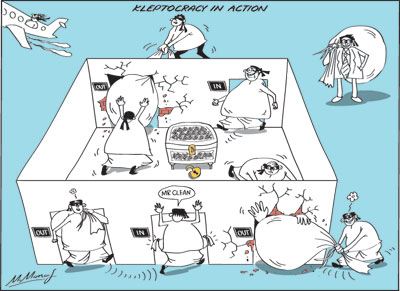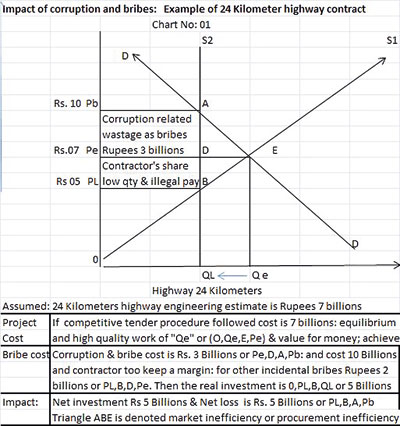Kleptocrats, from all sides, ruining Sri Lanka
The Sunday Times in a front-page story on May 6 headlined “Kantale Sugar Factory Bribery scam: Top officials’ deals exposed”, reported on the alleged corruption of two top public officials – the President’s Chief of Staff and a Corporation Chairman cum ex-Presidential high official.
A similar event was reported in the Sunday Times in September 2017 on a corrupt deal by officials’.
It is sad to note that the offenders are top Civil Service officials who abused and misused official power for the benefit of politicians. Similarly, the “Treasury Bond Issue Scandal” and many other billions of rupees worth of corrupt cases are before courts of law. The National Procurement Commission (NPC) receives at least 15 cases a week on procurement-related corrupt practices. Corruption complaints to the Bribery Commission are also many while some are hidden. There is evidence to believe, that the root cause of this present political instability and the economic uncertainty in Sri Lanka is due to the public sector corruption-related kleptocrats fighting inside and between the main political sides. The objective of this article is to discuss mainly economic consequences of corruption on the Sri Lankan economy and spotlight the issue of corruption as it is an obstacle to achieving development targets including Vision 2025″.
Playing grounds of kleptocrats
Evidence suggests that the root cause of kleptocrats fighting and the whole obstructionist action by the opposition political parties is corruption. Governing parties at the 2015 election promised to strengthen good governance, eliminate corruption and to bring in social justice. Unfortunately, just after the elections, many kleptocrats, both politicians and officials, joined the new President and Prime Minister while others remained with the former president’s opposition group. Those joining the governing party did so with the express intention of hiding their earlier corrupt actions. It is worthwhile to note that high level corruption is in the public procurement sector and the names of many powerful people are attached to procurement corruption.
On the other hand, the government is engaging in a new form of organisation by the major two parties with mixed and different political ideologies on economic and social grounds, a model never ever tested before. Therefore, very often lack of consensus on economic, political and social policy issues between the two main parties affects the economy badly, leading to disagreements even within the same party. The opposition obviously took the advantage of these internal conflicts and with the help of trade unions and pressure groups began to organise obstructionist actions to cripple the government’s economic programmes. By and large the opposition took the maximum benefits, capitalising on the Treasury Bond corruption issue and using it to divert attention from their own, previous corrupt deals.
In addition, the authorities also invited unnecessary attention to unwanted policy changes which are not demanded, requested or even promised by the government. For example: cash vouchers instead of school uniforms, bank drafts for subsidised fertiliser, Wi-Fi facilities, insurance cover for all school children, etc.
Opposition was further fuelled by the local Government elections win and some of the SLFPs crossing over to the opposition expecting a guaranteed future. Instead of fighting against corruption, it appears that the governing politicians are now struggling to survive and protect political power with elections not too far away.
Vision 2025 and corruption
“Vision 2025″ specifically stated that “we will stamp-out corruption by encouraging competition by enabling transparency. To give all Sri Lankans an equity chance at prosperity” (Page 11). However, corruption has already increased in this regime than in the past. Having realised the high level of corruption, it is unfortunate to note that the planners failed to attach a “national level corruption-risk mitigating plan” to the Vision 2025.
Corruption rating
Corruption in Sri Lanka has accelerated beyond manageable limits, more dangerous than terrorism, and has corroded society to its core, eroded trust, honesty, ethical and moral values building mistrust among the people. In Transparency International’s rating of corruption Sri Lanka is placed 91 out of 180 countries. In 2018, this rating may worsen when considering the ongoing rate of corruption.
Obstructionist modes
Although there are respectable politicians, evidence suggests that at present Sri Lanka is badly affected by kleptocrats fighting in some of the governing party and opposition parties’ elites, accusing each other of corruption and warning of punishment in the future. Corrupt state officials are joining both sides, creating a massive and powerful network of kleptocrats. In addition, some of the politicians’ family members get appointed to various Ministerial posts, further sowing the seeds of corruption.
These people are robbing the poor taxpayers’ money and destroying the Sri Lankan economy, social harmony, societal values and sustainable existence. Many of the biggest crooks who are beneficiaries of free education and health services are even stealing a pin from the government and abuse power and authority for selfish gains.
Corruption in economic theories
Until the 1980s, economists didn’t consider or perceive corrupt behaviour as an economic problem but today it is the main obstacle to sustainable development. During the days of sovereign rule, the power of tax collection, disbursements of public funds together with judicial power and legal authority was enjoyed by the king. During the Mercantile-era, Parliament progressively took over public treasury activities while renowned economists Adam Smith and Alfred Marshall supported free markets and introduced extensive economic regulations, rules and procedures and accountability, adopted by the Parliament. Neo-classical economists brought in business ethics, moral obligations, traditional values and customs into public finance. In the 1970s, “public choice” was considered in the mixed-economies while promoting the move from “economic markets” to “political markets” during the 1980s. Subsequently, “public choice” became “rent seeking”, later exploited by the politically, monopolistic market process.
Today corruption is an economic problem and endemic. Politicians and high-ranking public officials adopt positions related to “Monopolistic and Discretionary” authority for personal benefit in the absence of strong Parliamentary accountability and governance obligations attached to public spending. For example in the Kantale sugar factory deal, the officer holding the authority had demanded a bribe, disregarding even the PPP (public procurement) and FDI investment policy.
Economic impact of corruption, bribe
Chart No: 1 below shows an example of the economic impact of corruption in relation to a 24 km highway contract. The equilibrium contract price is
Rs. 7 billion assumed as the competitive market price and Qe is the quantity and quality of the contract. If the authorities demand bribes, the tender committee has to approve a higher bid, rejecting the lowest evaluated substantially responsive bidder and manipulate procurement guidelines. The assumed three lowest bidders are rejected and fourth lowest bid is approved.

Source: Example Chart: Constructed by the author
The selected bid will cost Rs. 10 billion and the bribe of Rs. 3 billion goes to corrupt authorities. It is interesting to note that the contractor also keeps 10 per cent to 20 per cent margin and the real investment is reduced to Rs. 5 billion, noted as QL and S2. Ultimately it is low quality road construction, not according to the specification and unusable within a shorter period, with high maintenance cost. The triangle ABE is the market failure and in this case, procurement inefficiency. According to the estimated cost of procurement inefficiency, it is approximately Rs.6 billion. Total loss to the economy? Rs. 11 billion!
If this contract is assumed as an unsolicited contract, at least Rs. 25 billion has to be paid by the future generations although the real investment is Rs. 5 billion.
Amplified debts payable
Corrupt authorities always favour large-scale public infrastructure projects and obviously they are “unsolicited contracts”, with high-cost-debt-funding, a sovereign guarantee and a pre-selected contractor. Sri Lanka is historically famous for a plethora of white elephant projects, built on debt financing. At least 50 per cent of the total cost of these dubious projects are beyond reach of the tax authorities and investigators and unaccountable because these are off-shore transactions.
Looting the public Treasury
Corruption breeds corruption and weakens the corruption-controlling state institutions particularly police, law enforcing authorities, tax and bribe investigation authorities, ultimately resulting in jeopardising Treasury revenue and expenditure targets. As a result, the Treasury has a challenging problem of fiscal consolidation – irrespective of high expenditure needs, a widening gap in trade and BOP due to poor export earnings and exchange rate depreciation with the inflated public debt balance and repayment programmes destroying the whole public finance management system. According to evidence, corruption at Customs, Excise and Income Tax is considered as “granted”. Finally corruption and bribe are supposed to be paid by the general public in terms of added cost for goods and services.
High posts for the corrupted
Corruption develops uncertainty in the economy and mix-allocation of human resources. Many high political authorities will not pick the right person for responsible posts, instead hiring them through the backdoor. Many such appointees are relations and friends or politician’s school mates. Under these circumstances, the educated, experienced and competent with clean records of public service career are not picked and remain silent and disgruntled. Some go abroad in disgust. Many such officers hardly get opportunities to be appointed as Secretaries or CAOs in the government. At the end of every election, the crooks get high positions and this majority are those having links with both main political parties. Corrupt politicians prefer corrupt officials because their survival lies with those holding powerful bureaucratic positions.
For example, the recent incidence where an officer was appointed as the Presidential Chief of Staff Post and the other as State Timber Corporation Chairman, breaching intelligence and security clearances and not giving up their kleptocratic behaviour. It is also interesting that the new appointee chairman was removed within days and arrested by the Police after JVP’s whistleblowing, exposing his corrupt behaviour. It is noteworthy to provide due recognition to the JVP for its corruption-busting efforts.
Conclusion: Combating a new terror
At the beginning fighting against corruption may be a life-threatening task because bugs are already in all levels of political administrations, even in law enforcing institutions. Political will is the first and foremost condition for fighting against corruption. The President has the will but gets no support even from his supporters and staff. However sections of the public hopefully will join him to rescue this country from this scourge and new “terror”.
The battle against corruption and bribes, needs an army of genuine and honest professionals, armed with moral and ethical values, integrity, equity, accountability and a level playing fields and building good governance. In this battle, the citizen has a prime responsibility of selecting honest, exemplary role models as political representatives from village level to Parliament level. No room should be given to known crooks and perceived crooks to get positions. Intelligence services should guarantee their suitability and law enforcing institutions need to watch their activities.
The media should perform the whistleblowing role and expose corrupt officers and their deals and help the authorities with facts and evidence. Furthermore, take advantage of the 19th Amendment to the Constitution, allowing Independent Commissions to work genuinely under the supervision of Parliament. Alternatively, education about the danger of corruption should be taught at all levels in universities and at least A/L in schools to build an ethics and value-based culture and patriotism as well as the dangers of cronyism and favouritism. However it is doubtful whether the government would realise the gravity of the crisis and heed these warnings since the entire system is camouflaged by the kleptocrats fighting in anticipation of presidential election 2020.
(The writer is an Economist with Treasury level wide experience on the subject. He could be reached at palithaeka@yahoo.com)


